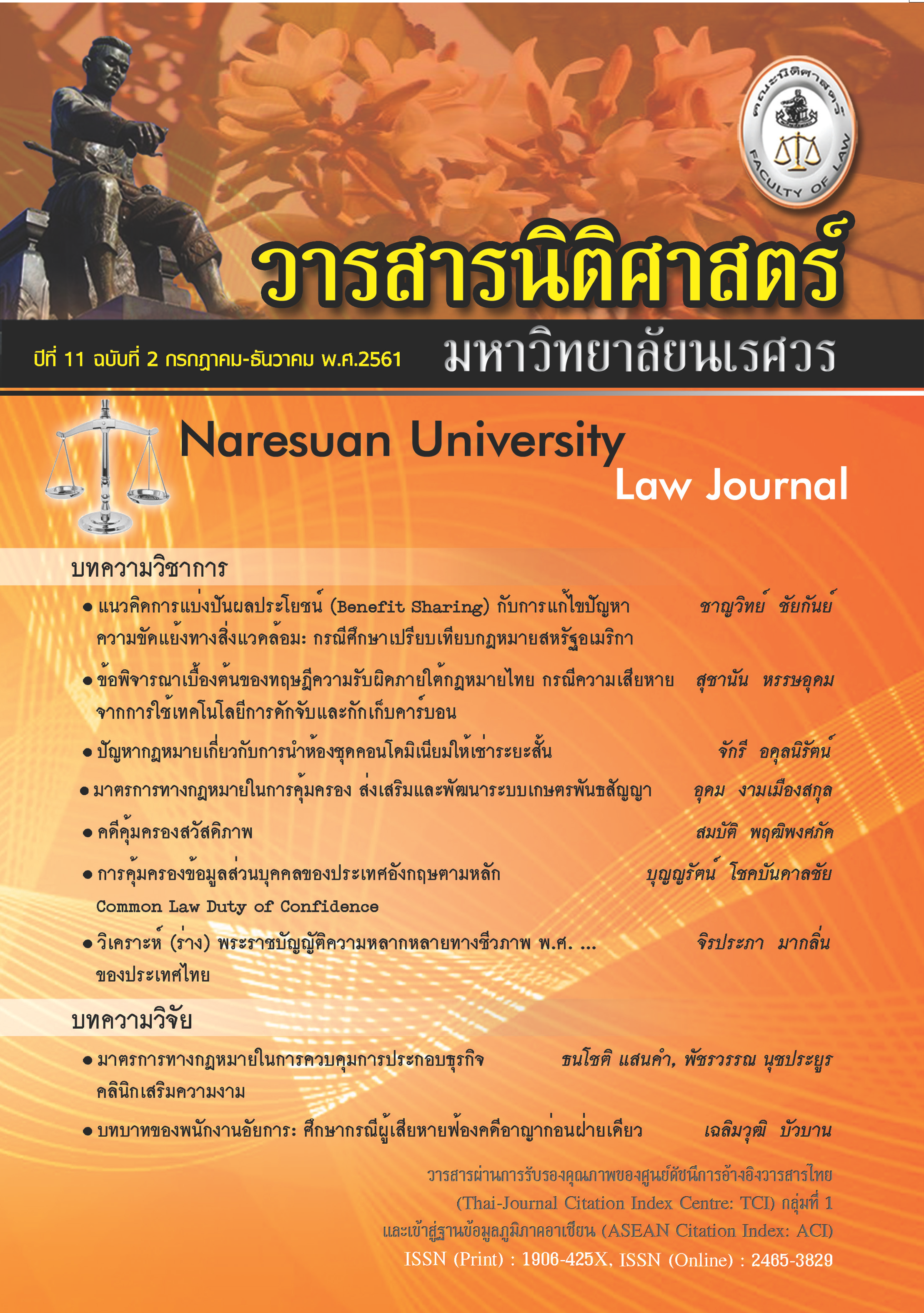The Role of Public Prosecutor: A Study of the Injured Person Solely Bringing a Criminal Case by Himself/Herself
Main Article Content
Abstract
This article is the conclusion of the content of a thesis on the Role of the Public Prosecutor: A Study of the Injured Person Firstly Sues in Criminal Case by Themselves aiming to study on concepts and theories related to criminal procedure and the roles of public prosecutor and injured person in criminal process.
The study of this article was conducted in the form of qualitative research through documentary research by studying from legal provisions, legal textbooks, and academic articles, in order to study on the guidelines on the roles of public prosecutor and injured person in criminal procedure and in the case of the injured person firstly sues in criminal case by themselves by comparing with laws of other countries, for example, France,Germany, UK, and U.S.A., etc.
The results revealed that Section 28 of Thai’s Criminal Procedure Code stated that persons entitled to institute criminal prosecution in court are the public prosecutor and the injured person and this section has never been amended since the Criminal Procedure Code was enforced in 1935. Whereas, process of the injured person to charge is unlimited therefore criminal procedure of the public prosecutor and the injured person is separated and independently from each other. After prosecution, the injured person is entitled to institute criminal prosecution solely whether such criminal case is compoundable offence or non-compoundable offence. Therefore, criminal prosecution of the injured person may damage criminal procedure, namely, the offender may use it as the opportunity to make an agreement with the injured person on secret settlement, especially any criminal case that is public offence whereas the injured person firstly sues in criminal case by himself/herself and the court sentences to dismiss such case. If the public prosecutor fails to acknowledge on criminal prosecution of the injured person or if the case is in the process of police’s investigation, the public prosecutor shall not be able to institute such criminal case again because it will become duplicity.
When comparing with foreign laws, it was found that the public prosecutor played the role in criminal prosecution for countries applying the principles of public criminal prosecution, whereas, the injured person had the limited power to charge. In addition,there was the connection among organizations in criminal justice process. Since the injured person has no opportunity to damage any criminal cases with non-compoundable offence, Thai public prosecutors should have the same role as that of other countries to maintain social benefits and protect people’s freedom and rights. Laws should be amended to prevent the injured person to damage any criminal case with noncompoundable offence. Providing public prosecutors to perceive criminal charge of the injured person would prevent damage against criminal case with non-compoundable offence and be consistent with public prosecution.
Article Details
References
Attapol Yaisawang. “Injured Person in Criminal Case.” Master’s thesis, Faculty of Law, Thammasat University, 1981. [In Thai]
Institution of Criminal Laws. Encyclopedia on International Justice Process. Bangkok: Seven Printing, 2540. [In Thai]
Kanit Na Nakhon. Criminal Procedure Law. 8th ed. Bangkok: Winyuchon, 2012. [In Thai]
Kanit Na Nakhon. German Public Prosecutors and Criminal Prosecution of German Public Prosecutors in Pre-Trial Proceeding, in Public Prosecutors and Criminal Case Investigation an Article Collection on Criminal Case Investigation of Various Countries. Bangkok: Chutima Publisher, 1998. [In Thai]
Kanit Na Nakhon. “Criminal Procedure and Concepts underlying Principle of Civil Law.” Public Prosecutor Journal 4, no.42 (1998): 53. [In Thai]
Kanit Na Nakhon. “Court’s Role in Criminal Case.” Dhurakij Pundit Law Journal 1, no.1 (January – June 2001): 49-64. [In Thai]
Kanit Na Nakhon. “Thailand’s Procedure Law: Principle of Law and Its Inconsistent Implementation.” Law Journal Thammasat University 15, no.3 (September 1987):1-17. [In Thai]
Kanit Na Nakhon. “The Role of Public Prosecutors and Criminal Investigation.” Law Journal Thammasat University 9, no.2 (1977): 133-141. [In Thai]
Kanueng Ruechai. Criminal Procedure Law Vol. 1. 9th ed. Bangkok: Deaun Tula, 2008.[In Thai]
Kiatkhajorn Watjanasawat. Explanation on Criminal Law Chapter 1 General Provision.10th ed. Bangkok: Pholsiam Printing Publisher Thailand, 2008. [In Thai]
Kiatkhajorn Watjanasawat. Explanation on Criminal Procedure Law Regarding Pre-Trial Proceeding. 5th ed. Bangkok: Chirarat Printing, 2006. [In Thai]
Kiatkhajorn Watjanasawat. Explanation on Criminal Procedure Law Regarding Pre-Trial Proceeding. 7th ed. Bangkok: Chirarat Printing, 2015. [In Thai]
Kowit Meepornbucha. “Prosecutor’s Inspection of the Criminal Prosecution by an Injured Person.” Master’s thesis, Faculty of Law, Dhurakij Pundit University, 2007. [In Thai]
Montree Chalermpai. “Measures on Scrutinizing on the Criminal Prosecution with Private Persons as Plaintiffs.” Master’s thesis, Faculty of Law, Dhurakij Pundit University, 2014. [In Thai]
Narong Jaiharn. Principles of Criminal Procedure Law Vol. 1. 10th ed. Amended. Bangkok:Winyuchon, 2009. [In Thai]
Pokpong Srisanit. Problems on Criminal Prosecution Instituted by Injured Persons,a Academic Article Collection Thammasat University, No. 3 of 2007. Bangkok:Thammasat University, 2006. [In Thai]
Supattra Yurachart. “Injured Person’s participation in Criminal Case.” Master’s thesis,Faculty of Law, Dhurakij Pundit University, 2013. [In Thai]
Surasak Likkasitwattanakul. Criminal Procedure Code (Reference). 10th ed. Bangkok: Winyuchon, 2010. [In Thai]
Udom Rat-amarit. “Criminal Indictment.” Law Journal Thammasat University 22, no.2 (1992): 240-251. [In Thai]
Uthai Artiwate. The Articles on Criminal Procedure Law of the French Republic. Bangkok:V.J. Printing Partnership, 2011. [In Thai]
Uthai Artiwate. “The Right of Injured Person in French Laws.” Bot Bundit 61, no.1, (2548):2. [In Thai]


